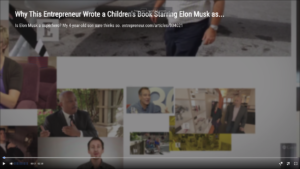Originally published in Entrepreneur Magazine
By Evan Loomis
My son Ward really likes his superheroes, and he doesn’t settle for just one. He picks the best parts of each, running around with a cape and lightsaber pretending he’s Superman-Batman-Flash-Hulk-Skywalker.
The breadth of his superhero knowledge is impressive. He frequently has to explain to me who a certain superhero is, or what imaginary planet we are saving next.
No one can distill information down to a single sentence like a 4-year-old can. You can ask him about any hero and get the best 10-second summary of his or her powers:
- Luke Skywalker: “He’s a Jedi who fights bad guys with a lightsaber.”
- Flash: “He runs faster than a rocket.”
- Wonder Woman: “She’s super strong and really pretty.”
About a year ago, I was asking him about his favorite heroes, and he was giving me his summaries. Then, completely on impulse, I asked him who Rosa Parks was.
He had no idea.
That one interaction planted the seed for a project that would consume the next year of my life, and it all started with one question: How do I teach my son about real heroes?
So, I built my son a hero wall.
Story time is a big deal in our house. Before going to sleep, I always read Ward a book or tell him a story. It’s a time for us to have fun together, and a time for him to stretch his imagination. Turns out, it’s also the ideal time to teach him about real heroes.
The problem with trying to teach a 4-year-old about real world heroes is two-fold:
- The real world is complicated.
- He’s four.
If I try to explain the historical context around Mother Theresa, for example, he would lose interest immediately.
But, with story time, I can teach him about a lot by simply telling him stories. Explaining the Civil Rights Movement in all its nuance to a 4-year-old is difficult, but telling him about Rosa Parks standing up to the bad guys is easy — and he loves it.
He has come to love stories about real heroes so much that I built him what I call his Hero Wall. He has dozens of his real-life heroes hanging on his wall, including:
- Entrepreneurs
- Civil Rights leaders
- Medal of Honor recipients
- Scientists and inventors
Now, if you ask Ward who Rosa Parks is, he’ll holler, “She wouldn’t give up her seat when a bad guy told her to get off the bus!”
Show him another picture: “That’s Michael Monsoor! He’s a Navy SEAL. He jumped on a grenade to save one of my daddy’s friends.”
And if you show him his favorite picture: “That’s Elon! He builds ROCKETS!!!”
Here’s why Elon Musk is my son’s favorite hero.
On the surface, Musk’s appeal to a 4-year-old is obvious: He builds rockets.
But, the more Musk stories I told Ward — and eventually, the more stories he made up about he and Musk saving the world together — the more I saw what really drew him to Musk: Musk’s ideas are so big, they sound like something a kid dreamed up.
Take for instance Musk’s idea to build tunnels under cities that shuttle cars around at 125 mph. Explaining that to a child is easy: Elon is building giant sleds that our cars can ride on to get places super fast. The engineering is extremely advanced, but the idea is simple because the vision is so grand.
You can explain any of Musk’s current ventures with the same ease:
- Tesla: “Cars that don’t need gas and drive themselves!”
- SpaceX: “Rockets that go up into space and come back down on their own!”
- Hyperloop: “Lets people travel hyper-speed in a tube!”
These are the sorts of things a child might ask a genie for if they were granted three wishes, and Musk is actually building them — which means, one day, Ward could actually build them too.
“But, are you sure Elon Musk is really heroic?”
As I’ve shared this story with others, sometimes they ask: “Are you really sure Elon Musk is the hero you want your son to look up to?” This is always followed by a list of Musk’s perceived faults.
I struggled with this concept for a while myself. I’m an entrepreneur, and I believe entrepreneurs are under-appreciated. Entrepreneurs build many of the most useful things in society. But, real-life heroes aren’t cartoons; they are human. They may have characteristics I don’t want Ward to emulate. How do I reconcile that?
What I realized is that Musk is an even better hero for my son because of his flaws. There is a deeper lesson than “dream big” for my son to learn from Musk, and it is this: Character flaws — outside of blatant villainy — don’t contradict heroism. The people who decide to commit to helping the world, despite making mistakes — as we all do — are heroes. In fact, it’s often the pain people experience that gives them the vision, energy and determination to do the heroic.
I want my son to look up to a man who was bullied and cast out as a child, but rose up to build amazing things. He doesn’t have to emulate every single aspect of his life. But, it helps to know his hero had his own human struggles and failures too.
Because Ward, and every other kid, is going to struggle. Let’s give them real-life heroes to carry them through it. They will undoubtedly create amazing things themselves.
Evan Loomis is a Founding Partner of Saturn Five.

